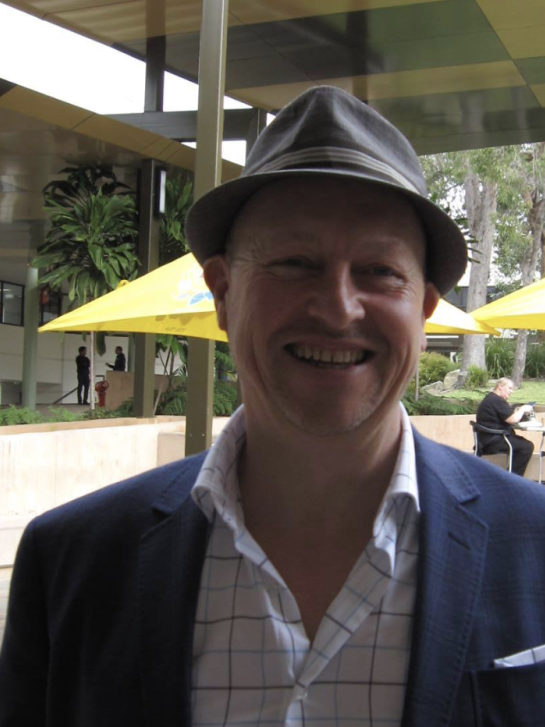

Dr. Guy Healy
Biography
Born in Australia, Dr. Healy spent 15 years as an education and science reporter for Australia’s national broadsheet, until digitisation undercut the business model of newspapers. He resigned and went freelance to produce 17 investigations for BBC Wildlife magazine. He transitioned to university research working on national-priority news media projects including Combating Violent Extremism, Mapping the Childrens Internet, and innovative screenwriter-producer practices on YouTube. He subsequently completed his PhD at QUT’s Digital Media Research Centre with his Fast and Furious Filmmaking: Emerging Hybrid Online/TV Production Practices in Australia (2020). Under principal supervision by Emeritus Distinguished Professor Stuart Cunningham, co-author of Social Media Entertainment: the New Intersection of Hollywood and Silicon Valley (2019), Healy’s dissertation was nominated for an Outstanding Doctoral Thesis Award by an external Screen Academy examiner, herself an Emmy-nominated documentary filmmaker. Healy did a PhD-to-book conversion published for Routledge as The Production of Global Web Series in Networked Age (2022). UCLA Research Professor John Thornton Caldwell described Healy’s book as doing ‘the heavy-lifting’ for how film schools such as UCLA can meet the existential challenge to their raison d’etre from a generation of skilled young students applying to film school already with highly-trafficked YouTube channels (pers comm). Based in the Media Innovation and Policy research unit at VUB, Healy is presently midway through a two-year postdoc, Innovation and Diversity in Algorithmically-Based European Screen Storytelling (IDABESS), jointly funded by the European Commission and the EUTOPIA alliance of universities under Horizon Europe, 2020. In his first career as a journalist, his most important story reported on calls from zoologists warning that research funding into, and surveillance of bat-borne viruses in Asia, Africa and elsewhere, had to be prioritised in 2009.
Guy Healy seeks to better understand how storytelling and creativity itself is co-evolving with the contemporary global networked video ecology. His book tells the story of diverse online creators – women, ethnic and racial minorities, queer folk, and those from hardscrabble backgrounds – producing low-budget, high-cultural impact webseries that have disrupted longstanding white male domination of the film and TV industries. Author Healy addresses four burning problems faced by creators in the context of digital disruption (along with potential solutions), namely: the sustainability of monetising digital content and the rising possibility of middle-class artistic careers; algorithmic volatility; the difficulty of finding people to share jealously guarded industry knowledge as traditional craft-based mentoring and expertise-sharing mechanisms break down; and the lack of diversity and authenticity in high-profile storytelling. It includes nine case studies, five drawn from a second wave of outstanding YouTube-developed talent, transitioning to longer-form narrative, most collaborating with established TV producers working across the divide between online and established television culture, and all from under-represented and/or minority backgrounds. The balance are film-school and industry professionals leveraging YouTube in the same way, including two Writers Guild of America new media award-winners. These storytellers leverage their social networks and chase sustainable careers by reaching audiences of subscription video-on-demand platforms and mainstream online broadcast in Australia and North America. The Production of Global Web Series in a Networked Age is the first longitudinal study of this historic rapprochement between online and television cultures. Four of the cases are in Emmy-winning contexts, and one in an Emmy nominated context.
Innovation and Diversity in Algorithmically-Based European Screen Storytelling (IDABESS) has three goals. First, to diversify screenwriter demographics and geographics by harvesting innovative art and commerce models, and the skillsets used to achieve them, from auteurs/directors/screenwriters of popular and critical acclaim using socio-technologies to break out. Second, to produce a robust tool – via case studies of exemplary drama, comedy and non-fiction, convertible to book chapters for the planned IDABESS book, two Symposia to report findings back to the European Audio-Visual industry, and a final report to EUTOPIA - that will help put diverse European screenwriter-producers on a more sustainable footing in algorithmic culture, and so able to produce more compelling, pluralistic and authentic series to enable belonging, resilience and reflection among younger generations. Third, to better understand Intellectual Property ownership arrangements (Baujard et al 2019, 39), and trends in IP share between screenwriters and producers and distributors, and possible anti-precarity measures for reform.
Location
Pleinlaan 9
1050 Brussels
Belgium
